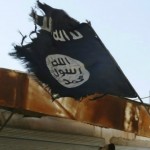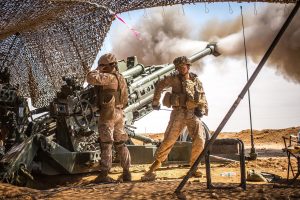by Wayne White
The Islamic State in Iraq and the Levant (ISIL or ISIS) has stunned Baghdad by overrunning most of Iraq’s second largest city in the north, Mosul. Yet, the Sunni Arab extremist group — in its zeal for a quick victory — may have overplayed its hand, sharply increasing the possibility of other parties entering the fray against it.
Reacting to the ongoing successes of Sunni Arab jihadists in Iraq, many wonder how the situation could have gotten this bad. By contrast, for several years now, I’ve been asking: “Why has it taken so long for Sunni Arabs to go on the warpath again?” Prime Minister Nuri al-Maliki, ruthlessly serving his narrow sectarian agenda, has made clear that Iraq’s Sunni Arab community has little stake in his Shi’a-dominated Iraq. His policies have made Sunni Arab push-back (in essence a revival of the post-2003 war insurgency) inevitable. Although a way out of this crisis is unclear, Maliki is not part of the solution.
The rising ISIL threat
Since ISIL wrested Fallujah and parts of Ramadi from Iraqi government control in early January, Maliki’s security forces have failed to eliminate or even contain the militants. With its expansive attacks into other areas of Iraq’s Sunni Arab heartland, ISIL is now in a position to menace the Kurdish Regional Government (KRG) enclave to the east, as well as locales farther south along Iraq’s central lines of communication, such as Samarra, Tikrit, and the key oil refining center of Baiji.
This dangerous challenge mounted by ISIL and some allied Sunni Arab tribal elements is not surprising. ISIL’s fortunes have waned in Syria in the face of Assad regime counterattacks and intense clashes with more moderate Syrian rebels. That’s why ISIL is pursuing potentially more fruitful opportunities across the border in a broad sweep of the predominantly Sunni Arab Iraqi territory adjoining Syria. The Sunni Arab minority there has grown steadily more embittered over its treatment by Maliki & his governments. Indeed, for over two years now, violent Sunni Arab resistance in Iraq (much of it having little to do with ISIL) has rebounded alarmingly, with nearly 9,000 Iraqis killed, mostly in violence ascribed to attacks by such militants, in 2013.
Maliki the enabler
Maliki and his hardline Shi’a cohorts prepared the ground for ISIL and other Sunni Arab jihadists. Even with Iraq on the brink of civil war and with sectarian cleansing tearing greater Baghdad apart in 2006-07, Maliki vigorously opposed the US deal with most Sunni Arab insurgents that took them out of the fight against the Coalition and turned them into allies against al-Qaeda in Iraq (AQI). This was the so-called “Sunni Arab Awakening”.
Worse still, in late 2008, Maliki actually tried to destroy an Awakening unit working with US forces west of Baghdad by sending Iraqi troops to attack them. US troops blocked the attack by placing themselves between their new Sunni Arab allies and Iraqi troops. On another occasion, Maliki arrested relatives of an Awakening leader in an attempt to force the latter’s surrender. Eventually, Maliki did agree, albeit reluctantly and only partially, to pay Awakening cadres and incorporate a limited number of them into the Iraqi security forces.
Maliki would later fall short of even those limited commitments, reneging on commitments to Awakening personnel and using special Iraqi security units operating under his own personal orders to arrest or assassinate Awakening leaders. Quite a few of those Sunni Arab prisoners subsequently disappeared into extrajudicial prisons run by Maliki and his cronies (just one of the abuses of power in which Maliki has engaged in recent years).
Maliki’s refusal to capitalize on Sunni Arab assistance brokered by the US was a missed opportunity of vast importance. Back in 2007-08, most Sunni Arabs were profoundly war weary after several years of bruising combat with US forces. As a result, a community previously determined to resist US forces and a government dominated by Iraqi Shi’a and Kurds, reluctantly accepted new realities. In exchange for ending their resistance and helping to battle AQI, Sunni Arabs expected a fair share of Iraq’s political pie, more government employment, and an appropriate slice of the country’s revenues. This, however, was not to be.
Securing a freer hand to deal with Iraq’s Sunni Arabs more harshly appears to have been one reason Maliki and his Iraqi allies backed away from the immunity agreement needed to allow a limited US military presence to remain behind after the American withdrawal. Both the Bush and Obama administrations tried and failed to secure this. Then, within 48 hours of the departure of the last US troops in mid-December 2011, Maliki had an arrest warrant issued against Iraq’s most senior Sunni Arab official, Deputy Prime Minister Tariq al-Hashemi, charging him with alleged involvement in “terrorism.”
Sunni Arab advantages
Following ISIL’s startling triumph in Mosul, many are asking why US training of Iraq’s security forces was not more effective. Yet, Maliki’s government cut short the hands-on, in-country work on the part of US advisors intended to complete that training — a major factor in the disappointing performance of government forces in Mosul. Another reason for the panic among Iraqi police and soldiers is rather sobering: in early fighting against ISIL and other jihadists by the Syrian Army, even elite, experienced Syrian units buckled in the face of such fanatical combatants.
Maliki also woefully underestimated Iraq’s Sunni Arabs (the same mistake made by the Bush administration in 2003 when it cast aside the Sunni Arab establishment and initially downplayed the insurgency). The challenge facing Iraqi government forces now is extremely dangerous: in heavy fighting during 2003-06, even US forces could not crush the post-invasion Sunni Arab insurgency.
The Sunni Arab minority had held sway over Iraq, politically and militarily, not only from independence in 1932 until Saddam Hussein’s fall, but far earlier during Iraq’s time as a province of the Sunni Ottoman Empire. So until Saddam was ousted, Sunni Arabs comprised most of the Iraqi officer corps and the army’s most elite formations. More broadly, as a ruling class, enhanced Sunni Arab access to wealth and education enabled them to dominate key professional fields and governance. Although out of power now, this community still represents a potent force, especially with its back to the wall in the face of grievances and exclusion.
Maliki needs to go
After years of spurning Sunni Arab cooperation, hounding Sunni Arabs out of governance, and turning Sunni Arabs into 2nd class citizens, Maliki is part of the problem, not the solution. Various pundits are urging that he make an “Awakening” like deal with Sunni Arab tribes, but his longstanding hostility toward the Sunni Arab community has left him badly discredited.
In the April 30 Iraqi parliamentary elections, Maliki made a strong showing, so a 3rd term as prime minister seems certain. Yet he was over 70 seats short of a majority, and has not yet succeeded in pulling together a coalition government.
In the current crisis, the largely Shi’a parties Maliki has partnered with in the past may rally around him instinctively. There is also, ironically, a misperception among many within Iraq’s majority Shi’a community that Maliki is the only reliable bulwark against Sunni Arab violence (despite his leading role in feeding it). By contrast, in recent years more savvy Kurdish leaders became increasingly concerned over Maliki’s polarizing policies — including problems with the Kurds over oil exports and territory.
Enter Iran?
The burning question now is: what can be done to take back ISIL’s gains. In response to ISIL’s seizure of Fallujah, the Obama administration provided drones, Hellfire air-to-ground missiles, stepped up delivery of combat aircraft, and additional intelligence. Clearly, that was not nearly enough. What is needed most at this point, with the Iraqi Army sagging, are additional and more reliable “boots on the ground.” This, however, appears unlikely to happen in terms of the US or its most capable allies.
There is another possibility: Iranian intervention. Maliki’s government and the two dominant Kurdish militias in the KRG have close ties to Iran. While the US and other Western states have been concerned about Iranian influence in Iraq, ISIL’s gains have now alarmed Tehran. Just today, Iranian officials reflected this deep concern and called for the international community to address the crisis. The foreign ministry also indicated Iran’s willingness to assist Iraq in confronting “terrorism.”
In 1996, one Kurdish militia requested and received robust Iranian Revolutionary Guard intervention to help repel its leading rival. If ISIL and affiliated Sunni Arab combatants move against the KRG, or continue their advance south toward Baghdad, the KRG, Maliki, or both might feel compelled to request the commitment of Iranian ground forces.
Photo: An undated image posted on a militant website in January shows fighters from the extremist Islamic State of Iraq and Syria, or ISIL, marching in Raqqa, Syria.





ISIS is funded y private Sunni donors in the Gulf. The fall of Mossoul has been enthusiastically received in Saudi Arabia as a hopeful sign that the Sunnis are still strong.
One wonders if Saudi Arabia has not fallen in a trap of tit for tat with Iran that they will pay dearlyt.
Years ago when the American were about to pull out of Iraq, the Saudi intel cheif turned to the yanks n said without mincing wrds “if u guys leave we’ll move in. We are not going to hand Iraq over to Iran”. So this comes as no surprise what so ever. Its just a promise that was kept
One reason I was alarmed by the outbreak of civil war in Syria, was a simple conviction this would lead to much greater chaos in Iraq.
you are blaming maliki but the outside power who created this
And the beat goes on. Oh where are those planners who caused this mess today? Perhaps up in the Ukraine? Considering their success rate since 9-11, it might be proper to give them a name all their own, such as: “Clusterfuck Incorporated”, a slogan such as: “we bomb them, rip off their wealth, leave death and destruction in our wake, then move on to the next target”. Perhaps I’m being cynical here, but face it, I’m not the first to point it out.